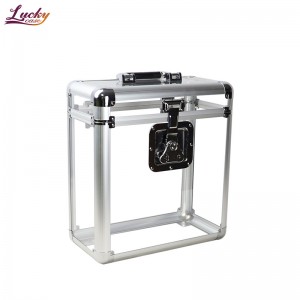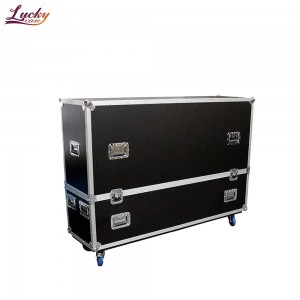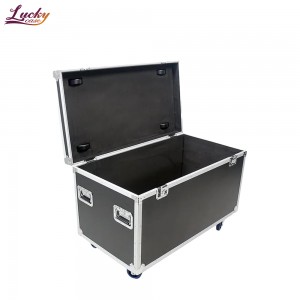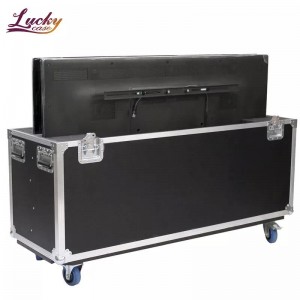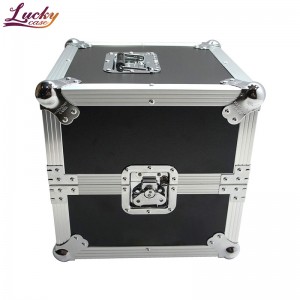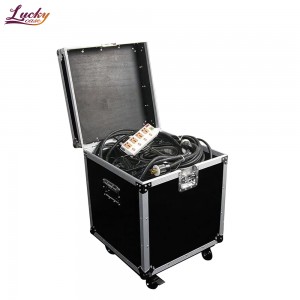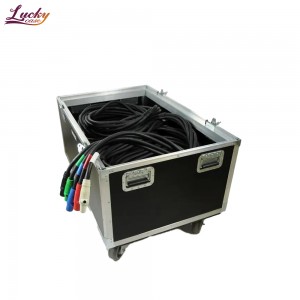
Custom 19-inch Rack Cases
Durable 19″ 6U DJ Rackmount Equipment Case
♠ Product Description
Sturdy Construction
Designed for standard 19″ rack-mount equipment. Crafted from durable 9mm plywood with a scratch-resistant finish, this case features double front rack rails, protective covers, and high-quality assembly accessories. Built with heavy-duty hardware for long-lasting performance.
Versatile Application
The 6U rack case offers excellent protection for amplifiers, mixers, wireless microphone systems, snake cables, networking devices, and other rack-mountable gear.
Available Sizes
Options include 2U, 4U, 6U, 8U, 10U, 12U, 14U, 16U, 18U, and 20U. Choose the appropriate size based on your equipment needs. Custom internal layouts and accessories are also available.
♠ Product Attributes
| Product name: | 19" Space Rack Case |
| Dimension: | 6U - 527 x 700 x 299 mm, or Custom |
| Color: | Black/Silver/Blue etc |
| Materials : | Aluminum frame+ Freproof plywood +Hardware |
| Logo : | Available for silk-screen logo / emboss logo / laser logo |
| MOQ: | 30pcs |
| Sample time : | 7-15 days |
| Production time : | 4 weeks after confirmed the order |
♠ Product Details

Dual Spring-Loaded Handles on Each Side
Fitted with spring-loaded, ergonomic handles on both sides, this case offers a comfortable, non-slip grip. The spring return mechanism ensures the handles lay flat when not in use, improving portability and minimizing snagging during transport.

Front and Rear Removable Doors
Both the front and rear panels are fully removable for easy access to your gear. Each door is securely attached with two robust twist latches, allowing for quick setup and breakdown while maintaining excellent security.

Reinforced Ball Corners for Impact Protection
The case features specially designed heavy-duty ball corners that provide superior shock resistance. These reinforced corners help prevent damage from bumps, drops, or other impacts—offering added safety for your valuable equipment.

Secure Heavy-Duty Twist Latches
Equipped with high-quality, heavy-duty twist latches that fit precisely with the case body, ensuring a secure closure. These latches offer enhanced protection for your equipment by keeping the case firmly sealed during transport or storage.
♠ Production Process
1.Cutting Board
Cut the aluminum alloy sheet into the required size and shape. This requires the use of high-precision cutting equipment to ensure that the cut sheet is accurate in size and consistent in shape.
2.Cutting Aluminum
In this step, aluminum profiles (such as parts for connection and support) are cut into appropriate lengths and shapes. This also requires high-precision cutting equipment to ensure the accuracy of the size.
3.Punching
The cut aluminum alloy sheet is punched into various parts of the aluminum case, such as the case body, cover plate, tray, etc. through punching machinery. This step requires strict operation control to ensure that the shape and size of the parts meet the requirements.
4.Assembly
In this step, the punched parts are assembled to form the preliminary structure of the aluminum case. This may require the use of welding, bolts, nuts and other connection methods for fixing.
5.Rivet
Riveting is a common connection method in the assembly process of aluminum cases. The parts are firmly connected together by rivets to ensure the strength and stability of the aluminum case.
6.Cut Out Model
Additional cutting or trimming is performed on the assembled aluminum case to meet specific design or functional requirements.
7.Glue
Use adhesive to firmly bond specific parts or components together. This usually involves the reinforcement of the internal structure of the aluminum case and the filling of gaps. For example, it may be necessary to glue the lining of EVA foam or other soft materials to the inner wall of the aluminum case through adhesive to improve the sound insulation, shock absorption and protection performance of the case. This step requires precise operation to ensure that the bonded parts are firm and the appearance is neat.
8.Lining Process
After the bonding step is completed, the lining treatment stage is entered. The main task of this step is to handle and sort out the lining material that has been pasted to the inside of the aluminum case. Remove excess adhesive, smooth the surface of the lining, check for problems such as bubbles or wrinkles, and ensure that the lining fits tightly with the inside of the aluminum case. After the lining treatment is completed, the interior of the aluminum case will present a neat, beautiful and fully functional appearance.
9.QC
Quality control inspections are required at multiple stages in the production process. This includes appearance inspection, size inspection, sealing performance test, etc. The purpose of QC is to ensure that each production step meets the design requirements and quality standards.
10.Package
After the aluminum case is manufactured, it needs to be properly packaged to protect the product from damage. Packaging materials include foam, cartons, etc.
11.Shipment
The last step is to transport the aluminum case to the customer or end user. This involves arrangements in logistics, transportation, and delivery.

The production process of this 19" space rack case can refer to the above pictures.
For more details about this 19" space rack case, please contact us!














